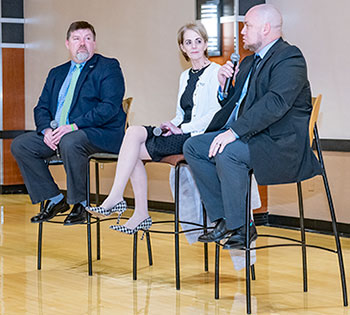About
Fort Hays State University, North Central Kansas Technical College, and Northwest Kansas Technical College are beginning a new partnership to provide stronger, forward-looking educational programs and services to rural central and western Kansas people, businesses, and communities.
 Kansas is home to strong, hardworking communities grounded in rich agricultural, manufacturing, and natural resource extraction traditions. It has all the ingredients to thrive. Yet like much of rural America, it faces a severe and growing demographic threat. For example, the population of the First Congressional District declined by 1.6% between 2010 and 2020, when the state’s overall population increased by 6%. This decline is particularly acute in the number of young people passing through our schools. Moreover, Kansas is among the least successful states in retaining its college graduates, a certain inhibitor to economic growth.
Kansas is home to strong, hardworking communities grounded in rich agricultural, manufacturing, and natural resource extraction traditions. It has all the ingredients to thrive. Yet like much of rural America, it faces a severe and growing demographic threat. For example, the population of the First Congressional District declined by 1.6% between 2010 and 2020, when the state’s overall population increased by 6%. This decline is particularly acute in the number of young people passing through our schools. Moreover, Kansas is among the least successful states in retaining its college graduates, a certain inhibitor to economic growth.
For rural Kansas to thrive, every individual must have the opportunity to develop their talents, skills, and interests. It is education that makes this development possible. It is education that develops talent and connects to opportunities that, in turn, build a workforce ready to support investment and growth. It is education that will ensure rural Kansas thrives.
Our three institutional missions, with their common emphasis on preparing students to become skilled, productive members of their professions and communities, already speak to this outcome. Each of our three institutions already does its job well. Yet Kansas’s future requires we do more. The best way for us to do more is to work together, forging a highly-collaborative partnership aligned with its practical commitment to rural Kansas. Working together, we will provide stronger, more accessible programs and services that take maximum advantage of our joint resources and varied locations while breaking down the increasingly artificial bureaucratic barriers that limit educational opportunities. We will provide unparalleled student services, ensuring everyone has a place, wherever they are, to pursue their educational goals. Working together furthermore ensures that our institutions become more robust, efficient, and cost-effective.
Working together also means working more closely with our businesses and communities. We will expand our already robust industry and community connections to increase opportunities for our students, increase entrepreneurship, and ensure we meet workforce needs. Therefore, as we see it, working together means uniting our educational institutions, industries, and communities in common cause to make certain rural Kansas thrives.
Our goals and guiding principles
Our partnership goal is straightforward: increase student and community success in rural Kansas. This outcome is the singular ‘true north’ by which we will measure partnership success, guided by two core principles:
- Always putting students first, we will meet them where they are by measuring each student’s success in terms of their goals and aspirations. This requires state-of-the-art advising that navigates each student through the entire range of enterprise-wide options and opportunities, including multiple delivery modalities and a completion-to-purpose model offering an array of certifications from stackable or modular credentials through traditional undergraduate and graduate degrees. It means serving learners of every age and in every circumstance: a working bookkeeper with years of credit-earning prior experience who is looking to become an accountant with evening classes delivered at a distance; a secondary school teacher who wishes to obtain a master’s degree so she can teach early college courses in her own classroom; a plumber seeking professional certification; and the traditional student just starting out on their career pathway.
- We promote success by creating active engagements that put each student at the center of a multi-party partnership that includes their academic program and related business, professional, and community-based groups. These engagements will give students the opportunity for paid, credit-earning professional experiential learning opportunities while still enrolled, positioning them for a productive and rewarding Kansas career. These partnerships will also allow Kansas employers to influence workforce development programs and enable them to engage productively with prospective employees. Examples include registered apprenticeship programs or working with professional associations to tailor programs to meet upcoming workforce and civic needs. In many instances, these relationships already exist. Our goal is to make them more accessible and more successful.